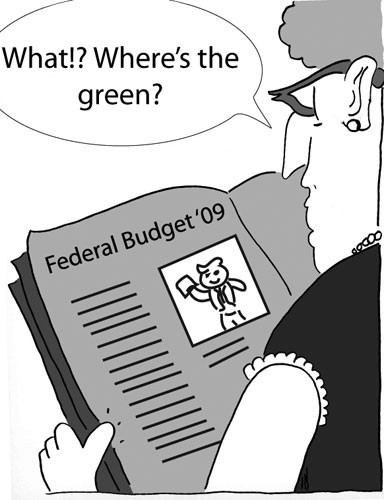Federal budget no green surprise
Environmental groups unhappy with green initiatives
Despite mounting a massive effort for government attention, environmental activists are disappointed Canada can be green with envy at its Southern neighbours, rather than green with sustainability.
The Canadian government should have taken more cues from American President Barack Obama, said Tim Weis of the Pembina Institute, an Edmonton-based environmental think tank and a member of the Green Budget Coalition (GBC).
“Per capita, the U.S. spends about four times more than us on environmental initiatives,” he said.
The GBC is a group of 20 environmental organizations that presented the government with budget recommendations emphasizing a focus on the environment in the month leading up to the budget.
The budget had a focus on stimulating the economy, which Weis considers connected to the environment.
“The economy and the environment are not two different things,” he said.
Yet the budget was not without its environmental high points. The government pledged a $10 million increase to better monitor environmental indicators such as air quality, water cleanliness and greenhouse gas emissions.
“ It is foolish to leave ecological and environmental issues alone at a crucial moment such as this.
Matt Morison (EcoPIA)
Weis was happy this was included, but regarded that recommendation as a minor priority.
A higher priority for Weis was renewable energy.
“Clearly no priority was put on it,” he said.
Another $1 billion was pledged for green infrastructure over five years.
The details of this plan are not yet available. Service Canada said the plan was “in its infancy,” and further information from the feds was unavailable before press time.
Weis put it in context.
“One billion over five years is only $20 million a year,” he said. “Compare that to Edmonton’s light rail program, which is about $4 billion dollars.”
Andrew Van Iterson, project manager for the GBC, is disappointed with the budget.
“Some notable environmental pieces were mentioned, but they missed some major opportunities.”
Van Iterson said the budget was put together quickly.
Fletcher Barager, economics professor at the University of Manitoba, agrees the budget was hasty in its treatment of the environment.
“The budget is a rush job,” said Barager. “If the government had been really committed to green projects, then there would already have been a lot more green thinking and planning in all departments.”
Matt Morison from of the University of Winnipeg student group Ecological People in Action (EcoPIA) was similarly disappointed by the context.
“Compare this to the $2.7 billion dollar loan to the auto sector, or even $500 million dollars set aside for home renovation tax credits,” he said. “These figures astound me in Canada’s short-sightedness.”
The budget also reiterated the proposed 20 per cent reduction in greenhouse gas emissions by 2020.
While it sounds good, Van Iterson pointed out that it is still not going by the Kyoto Protocol standards, which he feels Canada should follow.
Canada has signed and ratified the protocol, which calls on countries to reduce their greenhouse gas emissions by 5.2 per cent from 1990 levels. The protocol came into effect in February 2005.
“I will agree that Canada’s failing economy certainly did require immediate action,” Morison said. “But it is foolish to leave ecological and environmental issues alone at a crucial moment such as this.”
Weis remained optimistic.
“Just have to work harder next year,” Weis said.
Published in Volume 63, Number 20 of The Uniter (February 12, 2009)







